
Pregnancy induces significant physiological changes in a woman's body, affecting digestion and hormonal balance. As the body adapts to support the developing infant, some women may notice changes in how they react to certain foods, such as milk and dairy products, leading to the question, “Can pregnancy cause lactose intolerance?”
At Milktab, we're dedicated to helping expectant mothers enjoy dairy without discomfort. Our lactase pills are enhanced with triple the lactase enzyme (27,000 FCC units), along with protease and lipase, to aid better digestion. This powerful combination can be particularly helpful as your body undergoes changes. Plus, their slim design fits perfectly in your wallet, making it easy to have them handy wherever you go.
Based on our expertise and understanding of lactose intolerance, we’ve crafted this guide to answer whether pregnancy causes lactose intolerance. We aim to provide clear, practical advice on managing symptoms and maintaining a balanced diet. At the end, you'll find helpful tips and insights to support your health throughout your pregnancy.
Let’s dive in!
The Connection Between Pregnancy and Lactose Intolerance
Pregnancy itself does not directly cause lactose intolerance. Lactose intolerance is a condition where the body has difficulty digesting lactose, the sugar found in dairy products. However, dietary and digestive changes during this time can worsen existing intolerance in some women. Let’s explore more about “Can pregnancy cause lactose intolerance?"
Hormonal Changes and Gastrointestinal Health
Hormonal changes during pregnancy may lead some to question whether pregnancy causes lactose intolerance. As digestion slows, it can result in cramping and discomfort. These changes can make food intolerances, such as lactose intolerance, more pronounced. Here’s how hormonal changes during pregnancy can affect your digestive health.
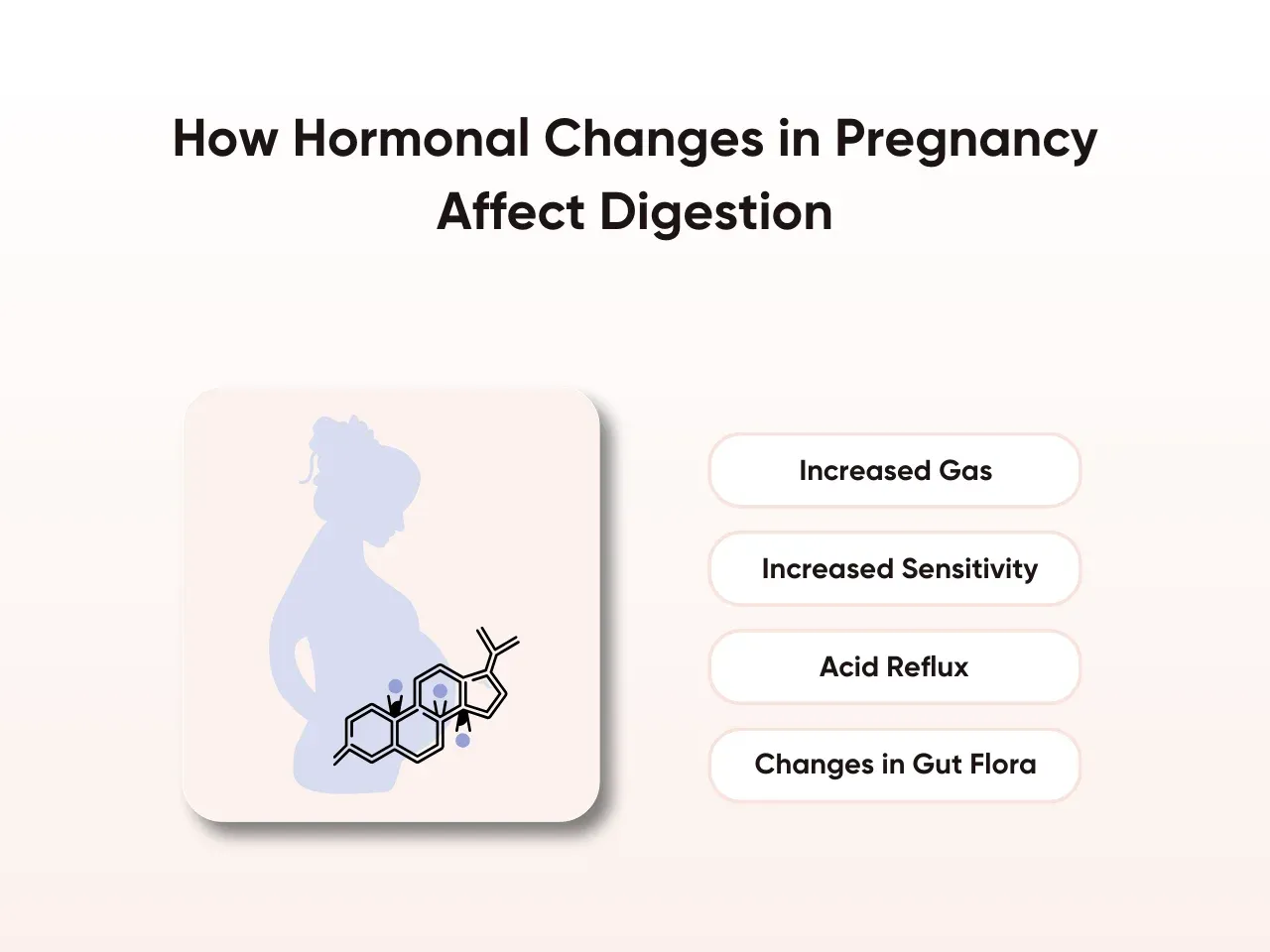
- Increased Gas: The slow passage of food through the intestines can lead to more undigested food, resulting in excess gas.
- Increased Sensitivity: Metabolic changes may slow digestion even further, possibly worsening lactose intolerance symptoms, such as nausea and vomiting
- Acid Reflux: Cellular weakness in the esophageal sphincter may increase the risk of acid reflux and abdominal pain.
- Changes in Gut Flora: Changes in the gut can further affect gut bacteria, digestion, and food intolerance.
Understanding how hormones like progesterone and estrogen affect digestion can provide insights into digestive issues. Progesterone can slow down digestion, while estrogen affects gut bacteria and overall digestive health. This knowledge is important for assessing whether pregnancy can lead to lactose intolerance, as hormonal changes during pregnancy may exacerbate existing symptoms.
Can Pregnancy Trigger Lactose Intolerance?
Scientific research on whether pregnancy causes lactose intolerance is limited. Most studies show that pregnancy itself does not directly trigger lactose intolerance. However, some studies suggest that hormonal adjustments and slower digestion during pregnancy might make existing lactose intolerance signs and symptoms more noticeable. Alterations in gut function could increase sensitivity to lactose in some women.
So, for those wondering, "Can pregnancy cause lactose intolerance?" there’s no definitive evidence pointing to no direct purpose, but it highlights the potential for increased sensitivity. It's important to monitor your signs and symptoms and consult a healthcare provider if you notice any new digestive problems during pregnancy.
Differences in Digestive Responses Among Pregnant Women
Reactions to lactose during pregnancy can vary widely among women. Some may experience increased sensitivity and digestive discomfort, while others might not notice any change. This variability can be influenced by individual digestive health and hormonal fluctuations, which makes pregnant women wonder if can pregnancy cause lactose intolerance.
Symptoms of Lactose Intolerance During Pregnancy
Pregnancy can cause diverse digestive issues, and figuring out the signs and symptoms of lactose intolerance is vital. Understanding how those signs vary from usual pregnancy discomforts is important to know if can pregnancy cause lactose intolerance.
Recognizing the Signs in Pregnant Women
Recognizing if can pregnancy causes lactose intolerance can be difficult, as signs and symptoms might also overlap with different pregnancy-associated issues. While pregnancy itself doesn't cause lactose intolerance, hormonal adjustments could make signs more noticeable, including:
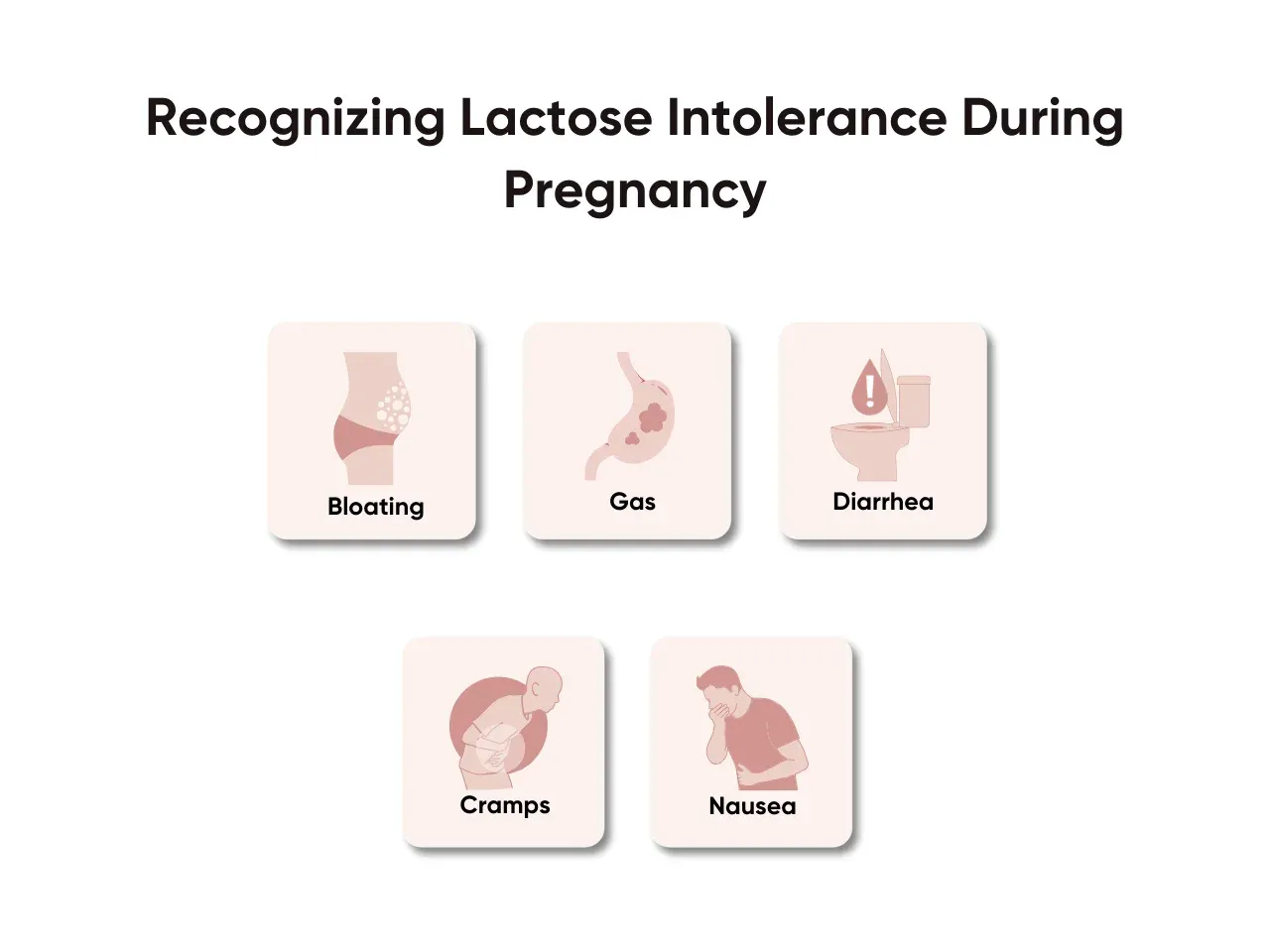
- Bloating: A feeling of fullness or swelling in the abdomen after consuming dairy products.
- Gas: Increased flatulence or belching following dairy intake.
- Diarrhea: Frequent, watery stools that occur after eating dairy.
- Cramps: It feels like menstrual cramps or discomfort after consuming lactose-containing foods. This ache may be more intense during pregnancy.
- Nausea: Feeling queasy or upset stomach after dairy consumption.
When to Consult a Healthcare Provider
Suppose you have symptoms of lactose intolerance all through being pregnant. In that case, speaking to your healthcare provider is crucial, especially if the signs and symptoms are severe or persistent. Seeking medical recommendations will let you know if can pregnancy cause lactose intolerance and help you control your signs and symptoms.
Addressing those troubles can make a significant difference to your comfort and well-being. Explore these key reasons why professional guidance is important:
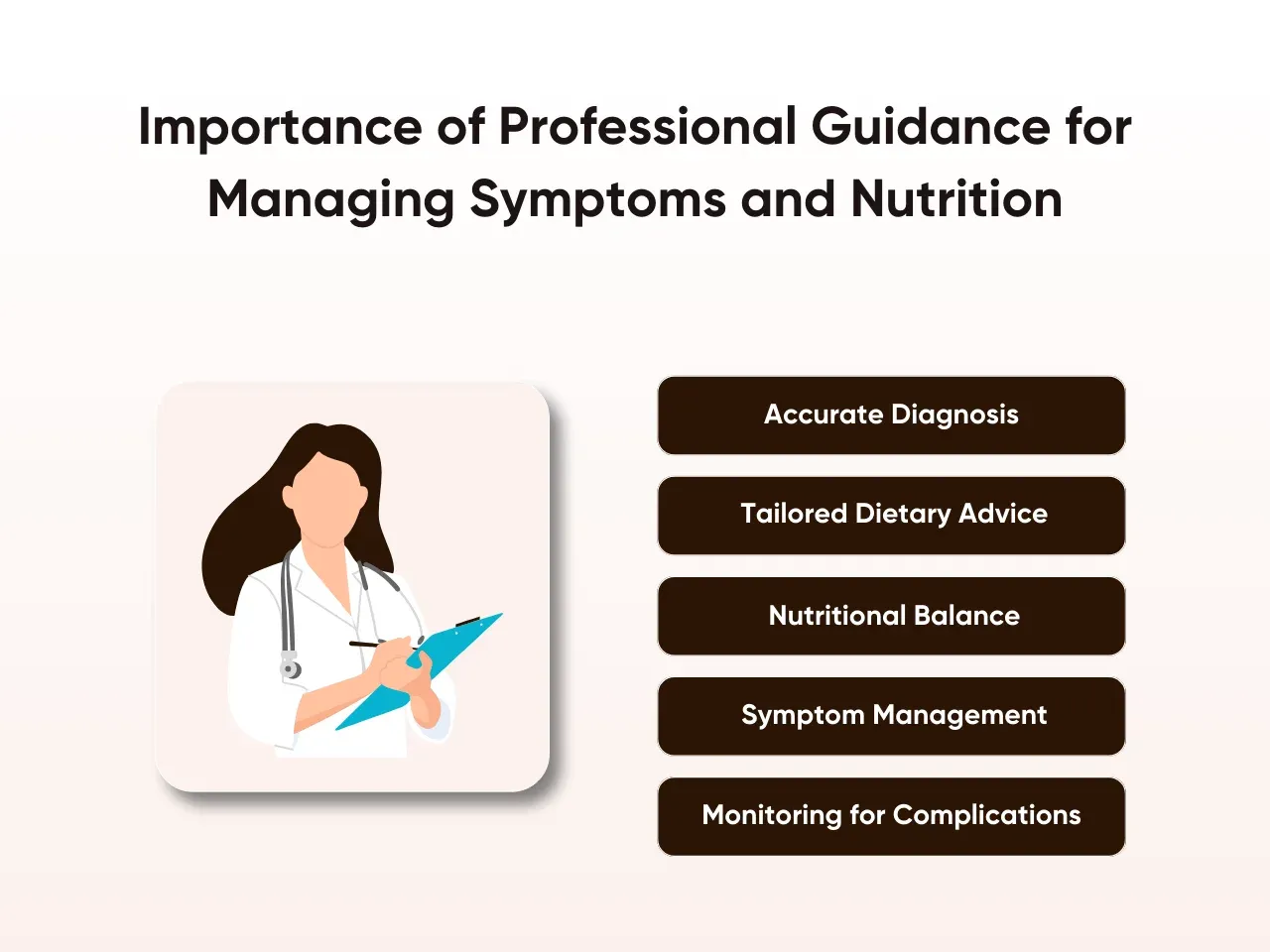
- Accurate Diagnosis: A healthcare provider can verify if can pregnancy causes lactose intolerance and give you guidance on the proper treatment for your symptoms.
- Tailored Dietary Advice: Professionals can give you personalized advice on dealing with lactose intolerance while still getting all the necessary nutrients. This helps you keep a healthy diet in the course of pregnancy.
- Nutritional Balance: They can help you discover other resources of essential nutrients like calcium and recommend supplements to maintain a healthy diet.
- Symptom Management: A physician can advise the best methods to relieve your signs. This can make your pregnancy more comfortable and reduce soreness.
- Monitoring for Complications: Regular check-ups can help track your symptoms and prevent serious issues as early as possible.
Common Symptoms Between Pregnancy and Lactose Intolerance
Understanding whether can pregnancy cause lactose intolerance can help manage new digestive symptoms during pregnancy. Pregnancy can bring about severe discomfort, which may be complicated by symptoms of lactose intolerance. Pay attention to when your symptoms occur to differentiate between the two. If you experience discomfort after consuming dairy, it could be a sign of lactose intolerance.
Keeping a food diary will let you track which meals trigger your signs and symptoms, allowing you to identify patterns and manage your diet more effectively. If you notice chronic signs or if they worsen, consult a healthcare provider. They can help identify whether your pain is due to lactose intolerance or another pregnancy-related issue.
Managing Lactose Intolerance While Pregnant
Adjusting your diet for the duration of pregnancy to manage lactose intolerance is essential for maintaining good health. To ensure you still receive all the essential nutrients while avoiding dairy, consider the following tips:
Dietary Adjustments for Lactose Intolerance
Managing lactose intolerance during pregnancy involves making thoughtful nutritional modifications to live comfortably. Avoiding excessive amounts of lactose in meals can prevent signs and ensure you get the nutrients you need. Exploring whether can pregnancy cause lactose intolerance helps in tailoring your diet effectively.
Here are some practical nutritional tips for handling lactose intolerance:
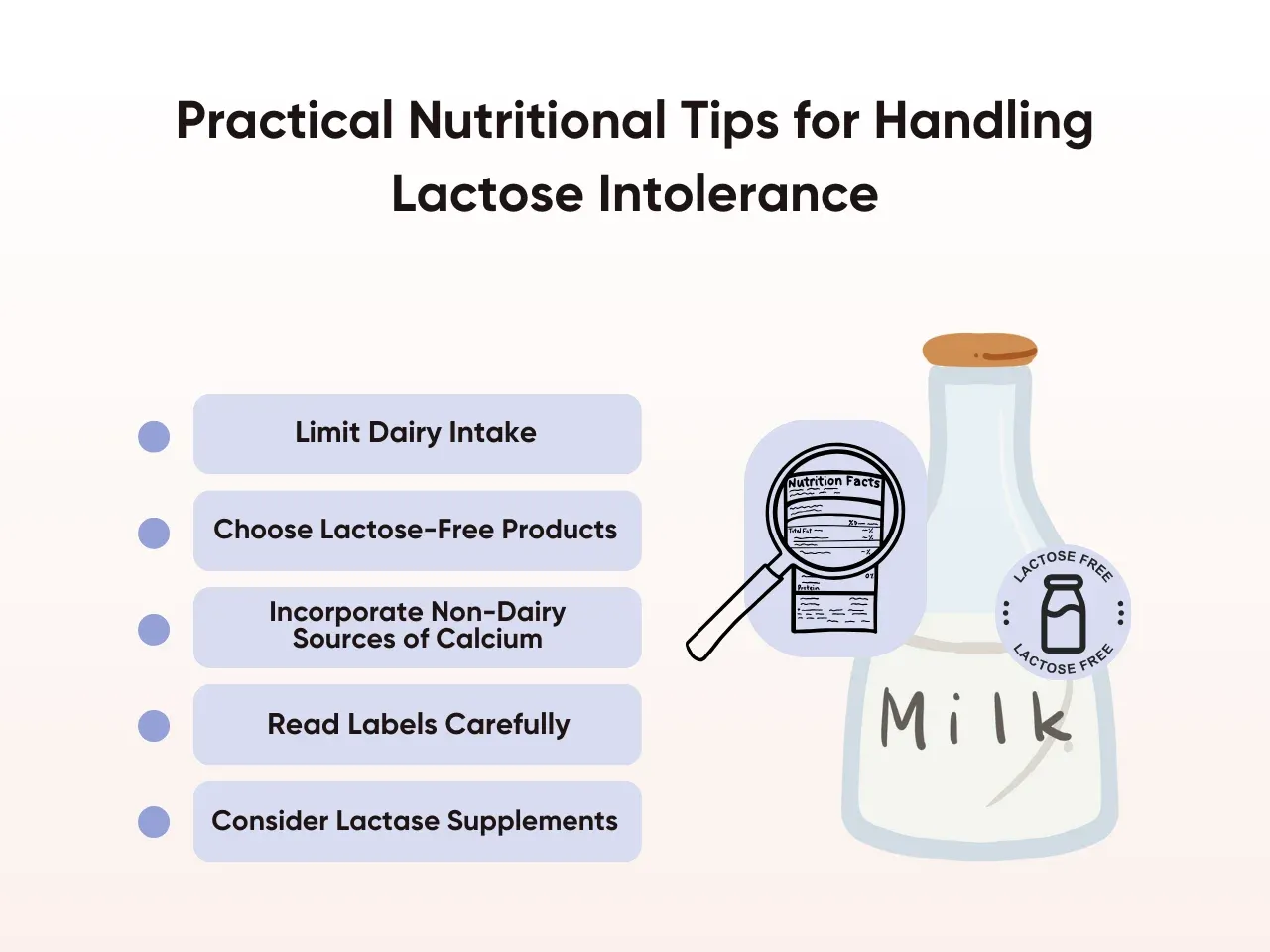
- Limit Dairy Intake: Reduce dairy products like milk, cheese, and yogurt intake. Opt for lactose-free versions or options to avoid discomfort.
- Choose Lactose-Free Products: Use lactose-free milk and dairy products that provide equal vitamins without causing digestive troubles.
- Incorporate Non-Dairy Sources of Calcium: Eat calcium-rich ingredients that don’t contain lactose, including fortified plant-based milk, leafy greens, and almonds. This guarantees you still get sufficient calcium for both you and your child.
- Read Labels Carefully: Check ingredient labels for hidden sources of lactose, including processed foods and medicines. Being vigilant helps avoid unexpected lactose intake.
- Consider Lactase Supplements: Lactase enzyme supplements let you digest lactose if you eat dairy often. These supplements can provide temporary relief and allow extra flexibility in your eating habits.
Supplements and Lactose-Free Alternatives
Lactase enzyme supplements can help break down lactose, making it easier to enjoy a varied diet without discomfort. In addition to these supplements, opting for lactose-free products ensures you receive essential vitamins without digestive issues. Some supplements and lactose-free alternatives to consider are:
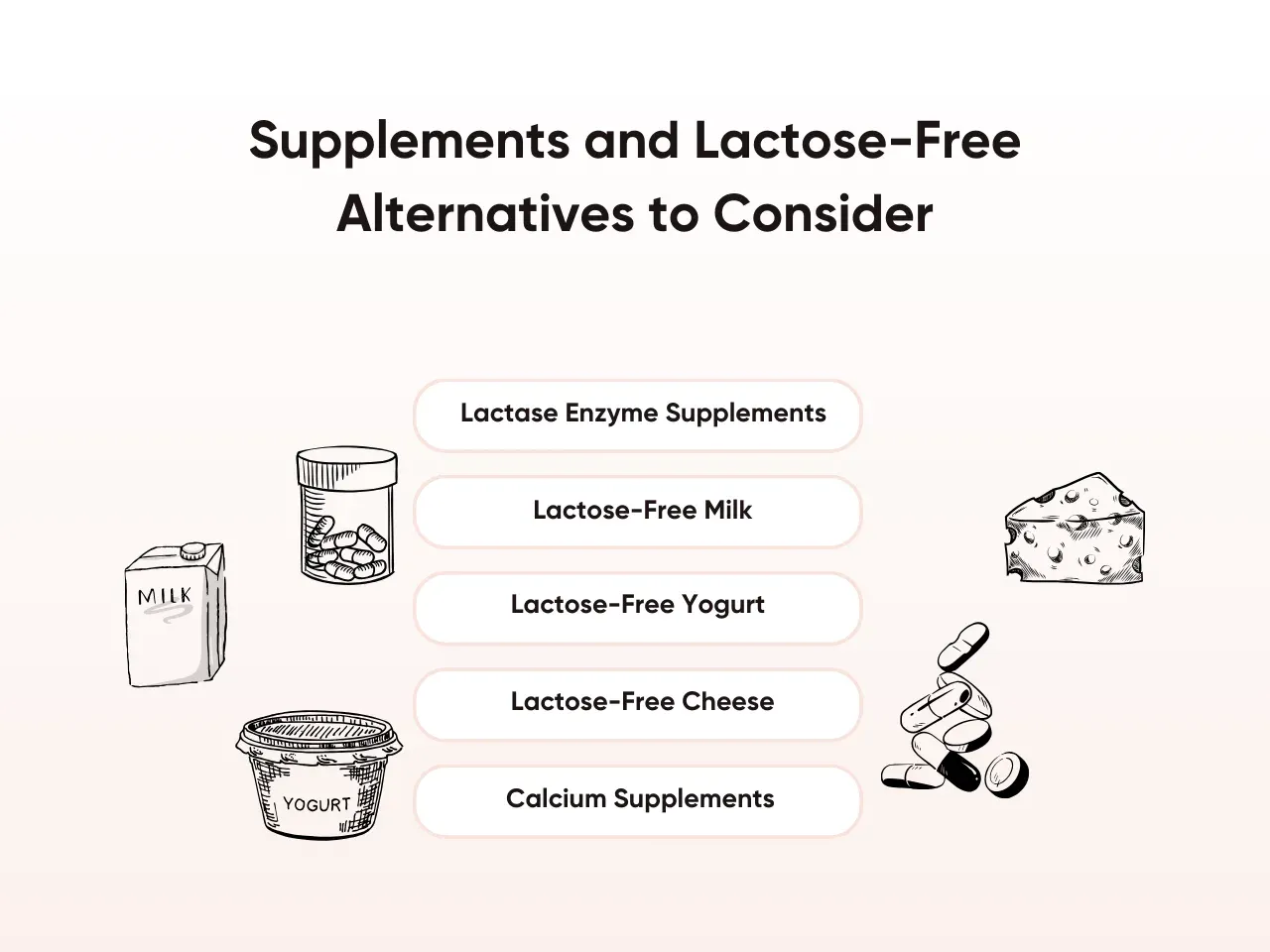
- Lactase Enzyme Supplements: Taking the best lactose intolerance pills earlier before consuming dairy could make it less complicated to experience those signs and symptoms.
- Lactose-Free Milk: Lactose-free milk is an excellent alternative to regular milk, supplying the same calcium and Vitamin D without inflicting digestive issues. It may also be used in cooking, baking, or as a drink.
- Lactose-Free Yogurt: This yogurt is much less complex to digest and offers valuable probiotics. It’s a good choice for breakfast or a snack and supports gut health.
- Lactose-Free Cheese: Look for cheeses that are specifically dairy-free, mainly used in recipes or as a balanced weight loss plan without causing severe symptoms.
- Calcium Supplements: A calcium supplement might be crucial if you struggle to get enough calcium from meals. This guarantees you and your little one sufficient calcium for stronger bones.
Nutritional Considerations to Maintain a Balanced Diet
Navigating lactose intolerance through pregnancy requires careful dietary adjustments to ensure you receive all essential nutrients. Avoiding dairy can make it challenging to get critical vitamins, but with careful planning, you can maintain a balanced diet. Here are the nutrients to consider for maintaining nutritional balance:
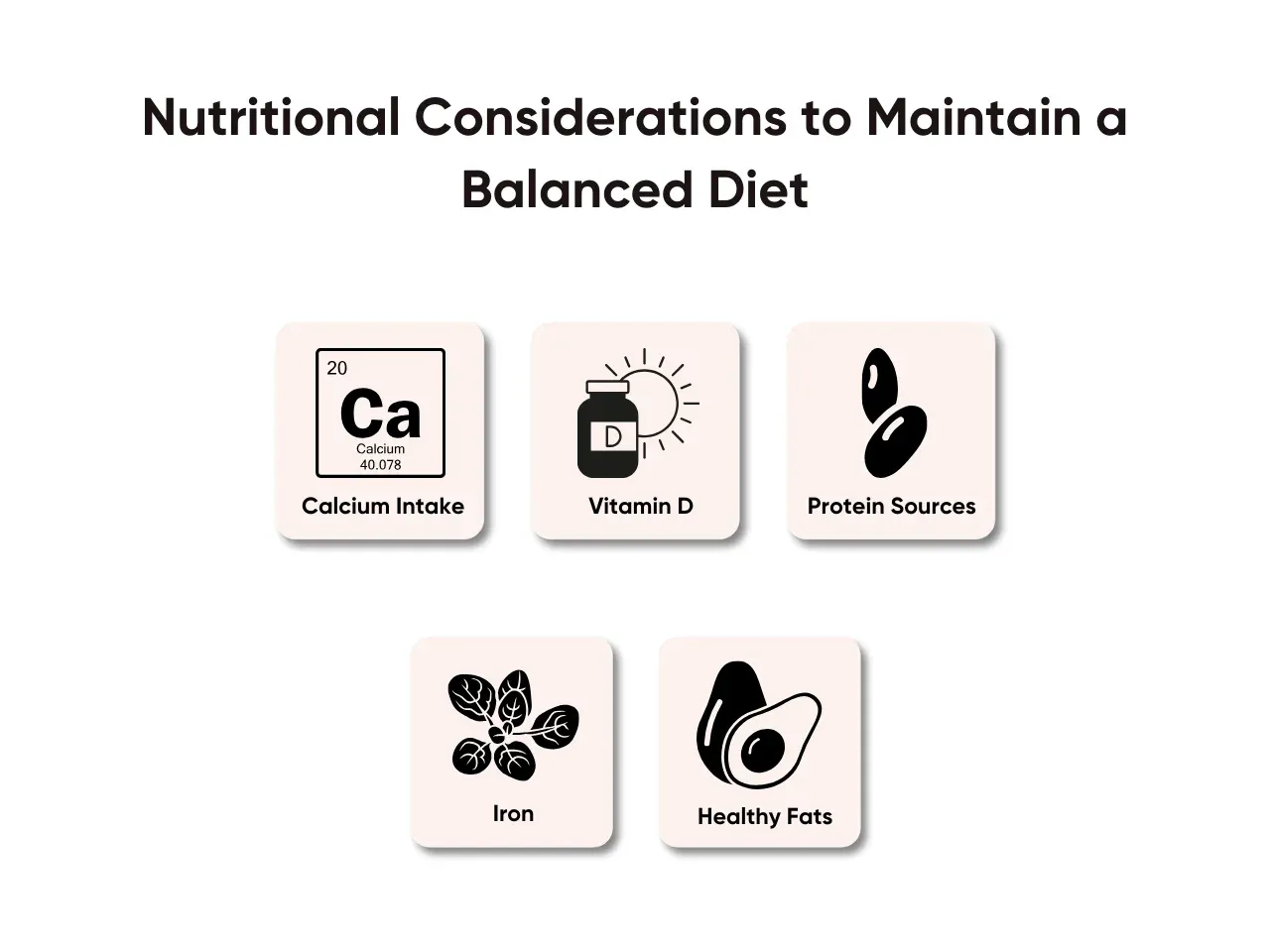
- Calcium: Essential for strong bones and overall health. Choose non-dairy sources such as fortified plant-based milks, leafy greens, and almonds to meet your calcium needs.
- Vitamin D: Helps your body absorb calcium efficiently. Include fortified foods or consider a vitamin D supplement to maintain adequate levels.
- Protein: Vital for your baby's growth and development. Ensure you get enough protein from sources like beans, lentils, and lean meats.
- Iron: Supports healthy blood and prevents fatigue. Incorporate iron-rich foods like spinach, fortified cereals, and lean meats to avoid deficiencies.
- Healthy Fats: Important for overall health and fetal development. Include sources like avocados, nuts, and seeds in your diet.
Focusing on these nutrient-rich alternatives and supplements helps you maintain optimal health for both yourself and your baby throughout your pregnancy.
Key Takeaway
Navigating lactose intolerance during pregnancy can be challenging. Understanding whether can pregnancy cause lactose intolerance is essential for maintaining comfort and nutritional balance. It's important for expectant mothers to monitor their symptoms and consult with healthcare providers to ensure they receive adequate nutrition while managing their lactose intake.
Incorporating lactose-free alternatives and ensuring adequate intake of essential nutrients can help you maintain a balanced diet. With these strategies, you can enjoy a healthier and more comfortable pregnancy without causing lactose intolerance. Consider including fortified plant-based milk, such as almond or soy milk, which provide essential vitamins and minerals.
Experiencing lactose intolerance during pregnancy and unsure how to find relief? Milktab lactase pills, enhanced with triple the lactase enzyme and additional digestive support, can help you enjoy dairy comfortably. For more information or personalized concerns, contact us at contact@milktab.co today.